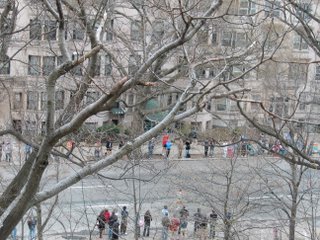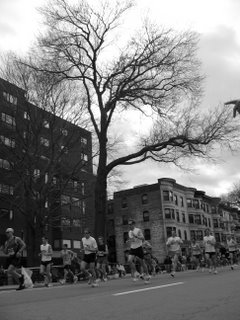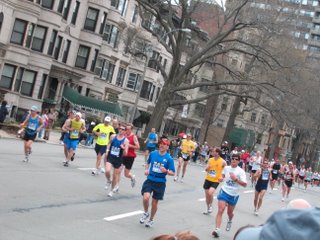That's the name of a real paper. This post is the first in a sequence of ruminations about the research process, inspired by
this post by Ventilator Blues. I decided to start here because (a) I told VB that I would, and (b) it's such a cool title.
The full title of the original paper is "Theory Development is a Jazz Solo: Bird Lives!". It may be located in the Proceedings of the Winter Educators' Conference of the American Marketing Association, 1984. The author is
Morris B. Holbrook. Holbrook is probably the smartest person I have ever met (although I realise that having said that, it's now impossible for me to email him this link). He also has a penchant for wonderful titles (can you say, "On Eschatology, Onanist Scatology, or Honest Catalogy? Cats Swinging, Scat Singing and Cat Slinging as Riffs, Rifts and Writs in A Catalytic Catechism for the Cataclysm"?). And he has a knack for looking at things very differently, in ways that can only make sense in retrospect.
This particular paper draws a parallel between the creative processes involved in the seemingly disparate endeavors of developing academic theory (specific to consumer research), and playing a jazz solo. In order to do this, Holbrook falls back on the Socratic model:
... in essence, both processes involve a dialectic that also underlies the occurrence of profound aesthetic experience. In this dialectical process, a thesis gives way to an antithesis; ultimately the thesis and antithesis combine to form a synthesis; subsequently, the synthesis serves as a new thesis on which to base further rounds of progress.
Having put matters thus, Holbrook proceeds to draw analogies for these key constructs across the two fields. Hence the existing underlying "structure" is linked to the thesis, as it "entails the patterns, contexts, motivations, categories, norms, and conventions that build probabilistic expectations"; the artist and scholar both working within a pre-existing framework of rules, a Kuhnian "paradigm". In a jazz solo, this structure consists of the harmonic and melodic framework of a piece -- the nuts and bolts that the masters pin down via hours of "woodshedding". In a research setting, the structure is the discipline's literature, its practices, extant frameworks, and received wisdom.
Departures from this structure, the antithesis, are caused by
playing. By inconsistencies, conflicts, or other incongruities -- departures that are introduced deliberately by musicians into their solos as variations on melody, harmony, or time. Academics observe such departures in their data, or pursue them, as Holbrook says, by having fun. We "play with ideas", he seems to argue, much as we "play music". "
By 'play', I refer to the mental habit of pursuing thoughts for their own sake, having fun with ideas, deriving joy from the activity of wrestling with puzzles, letting concepts take on a life of their own..." He quotes the pioneering psychologist Edward Tolman (someone whose work I base much of my own efforts on) as saying, "In the end, the only sure criterion is to have fun. And I have had fun."
I believe this point cannot be stressed too heavily. When one thinks of musicians toiling away every night, any concern for their grueling schedules and punishing work loads (or indeed the sheer physical investment required, as any video of Elvin Jones will testify) tends to be mitigated by the little voice of envy that observes people living to do what they love, and harvesting the immense satisfaction of immediate creation. It is the intrinsic motivation that makes it all worthwhile, in spades. To my mind, a researcher too has to live for the thrill of the chase. That apart, there's precious little in the game.
Returning to Holbrook, the third step in the dialectic is the synthesis, the reconciliation, wherein the "violations of organization and deviations from order are made to work via a reinterpretation of the piece within which they fit meaningfully". Such reinterpretations lead a performance to "swing". They also lead to the eureka moments when theory is developed. And that is the crux of the argument.
It is a neat idea overall -- catchy and well put together. It may be possible to dispute the analogy on the grounds that plenty of junk is published in academia, surely more than the number of bad jazz solos. It is a point worth pondering -- what makes an academic paper useful? Personally, I subscribe to the Kuhnian perspective that the bulk of science is about incremental advances. The researcher who spends a lifetime waiting for the apple to fall is unlikely to have contributed anything to mankind's corpus of knowledge (except perhaps a single data point to a hazard rate model of fruit drops). One who puts a shoulder to the wheel in good faith engages in a collaborative human effort -- one that goes back a long way. The magnitude of the visible contribution is not a good metric, as it is often not something that may be judged rightaway. The point is to have fun while doing it.
After all, not every jazz solo is Satchmo on West End Blues, or Bird on Ornithology. As far as I'm concerned, the appropriate model is Sonny Rollins. Ditch the habit, get on the bridge, late at night, every night.
Woodshedding his way to being the Colossus.
 These - Etymotics, to give them their proper name - are in-ear noise blocking earphones. You push them way way waayyy deeeep into your ear canals, where they (a) block out almost ALL external noise, and (b) provide the most blissful reproductions of whatever your iPod machine cares to serve up. The picture here shows the triple-phalanged tips. They also come with foam tips. You're supposed to roll these tips between your thumb and finger for about ten seconds (a most pleasurable exercise, recalling as it does the physical motions involved in rolling other things that promise bliss within the next few seconds, as soon as you fire them up) to thin them out slightly, then reach over your head with one arm, pull your other ear up, then insert the rolled-up foam-padded ear-plug deep into the pulled-up ear with a twisting motion, keeping your jaw slightly ajar. Then hold the pose for five seconds while the foam expands to seal off your ear canal. And repeat on the other ear/plug.
These - Etymotics, to give them their proper name - are in-ear noise blocking earphones. You push them way way waayyy deeeep into your ear canals, where they (a) block out almost ALL external noise, and (b) provide the most blissful reproductions of whatever your iPod machine cares to serve up. The picture here shows the triple-phalanged tips. They also come with foam tips. You're supposed to roll these tips between your thumb and finger for about ten seconds (a most pleasurable exercise, recalling as it does the physical motions involved in rolling other things that promise bliss within the next few seconds, as soon as you fire them up) to thin them out slightly, then reach over your head with one arm, pull your other ear up, then insert the rolled-up foam-padded ear-plug deep into the pulled-up ear with a twisting motion, keeping your jaw slightly ajar. Then hold the pose for five seconds while the foam expands to seal off your ear canal. And repeat on the other ear/plug.







 UFO
UFO